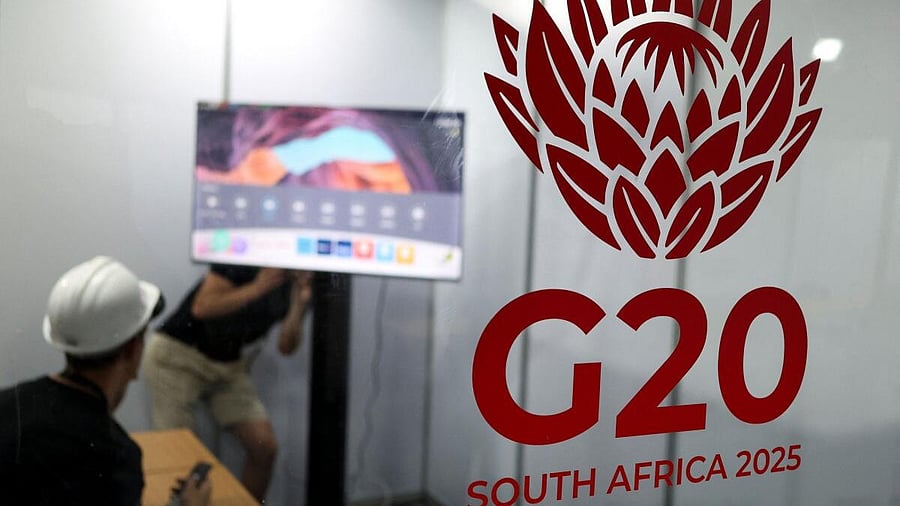
Workers appear behind a G20 logo as South Africa prepares to host the G20 Summit in Johannesburg from November 22 to 23, in Johannesburg, South Africa, November 13, 2025.
Credit: Reuters Photo
Johannesburg: Although South Africa has said the G20 Leaders’ Summit in Johannesburg this weekend will continue despite the absence of the US, there may be longer-term consequences for the host nation, experts have cautioned.
US President Donald Trump announced earlier that there would be no US participation at the Summit, citing allegations of white farmer genocide and illegal expropriation of land from them by the government. Both the South African government and white leaders have rejected these allegations as being false.
President Cyril Ramaphosa confirmed on Friday that the G20 Leaders’ Summit will proceed as planned on November 22-23, despite the US absence.
“President Trump has decided not to come, and he’s pulled out all the US representatives. But we have said that boycott politics never work," Ramaphosa said on the sidelines of an event here.
“The summit will go on. We are not going to stop because they are not here. We will continue and we will take fundamental decisions on matters that affect the people of the world,” Ramaphosa said, adding that nearly 40 other Heads of State and Government will be at the Summit.
However, analysts and researchers believe that the US absence may have a broader impact on South Africa, especially relating to finance and development.
“The US sponsors most of the international initiatives, like climate change. They use a huge amount of money for the operation of the United Nations and other financial institutions like the World Trade Organisation," Dr Nampula Mphahlele, a researcher on South African foreign policy, told the local daily The Star.
“If the US is boycotting (the G20), then it sends a strong message of the future of multilateralism and how the G20 is going to operate moving forward,” Mphahlele said.
She said that it was unlikely South Africa would lose its G20 seat, given that a country’s inclusion is voted on by members and not just by one person or country.
However, the US might continue excluding South Africa from certain activities, as invitations are often required to attend G20 meetings, such as the finance ministers' meeting and the working groups.
Dr Noluthando Phungula, an international relations expert from the University of Kwa-Zulu Natal, told the newspaper that Trump's decision was sending a message through an effective exercise of soft power.
“This is evident in the absence of the Argentinian president, who has also declined the invitation and has cited that he will send a representative,” she said.
According to her, the boycott speaks to deeper tensions between Pretoria and Washington and is sure to impact trade and diplomatic relations.
“It also has implications for those countries that are associated with the US. As you saw, Argentina is currently receiving financial support from the US, so obviously it has to be seen to be standing in solidarity with the US,” she said.
Phungula also expressed concern that Trump’s action will weaken US-South Africa bilateral relations further, pushing Pretoria closer to China, Russia, and other BRICS nations. She said South Africa's growing alignment with alternative global governance structures reflects a larger shift in global power dynamics, where nations in the Global South, such as South Africa, look to counterbalance Western influence. Phungula said the US decision to boycott the summit raises serious concerns about the future cohesion of the G20 and undermines the G20's legitimacy and effectiveness.
“This is as the US retains the position of being one of the key global economies that has a key role in the G20, which has in the past contributed to the stability of global financial markets, coordinating economic policy, and addressing geopolitical crises,” she said.
South Africa is scheduled to hand over the annual Presidency of the G20 to the US on Sunday, but there is now concern about how such a ceremony could take place with the US being absent.
Ramaphosa said that while South Africa would not want to hand over the G20 Presidency gavel to “an empty chair”, there will be a symbolic handover.
He emphasised that despite the boycott, the US remains an “important market” for South Africa.